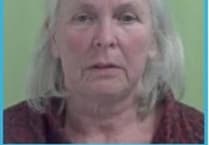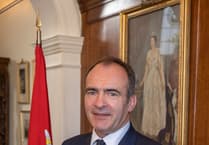Nearly 10 years ago, back in 2013, the then-manager of the Children’s Centre approached former television producer, director and journalist, Kerry Sharpe, with a proposition.
Would she consider writing a book to mark their upcoming 150th anniversary?
When she said yes, and started conducting research, she had no idea about the catalogue of abuse that she was soon to uncover.
Fast forward to last Friday.
On April 29, the former ‘senior house parent’ of Knottfield children’s home, Joseph Marshall, was jailed for six years for three indecent assaults and two counts of gross indecency.
He was handed the sentence for sexually abusing two young boys at the home on Woodbourne Road between 1974 and 1982.
Mr Marshall was found guilty back in December, after a five-day jury trial.
He had denied nine counts of abuse against three accusers, but he was found guilty on five of the charges.
The jury’s decisions were unanimous.
After the jury’s verdict was announced in court, acting Deemster Bernard Richmond revealed that in 1992, Mr Marshall was found guilty of 13 offences of indecent assault for which he served a three-year custodial sentence.
These offences also took place at Knottfield.
When Kerry originally started looking into the history of the Children’s Centre, she was fascinated to learn that children from the Isle of Man had been routinely sent to Canada, until around the time of the Second World War.
‘That elicited a really emotional response from me,’ she said.
‘I saw this list of names of kids that I realised none of us knew anything about, because it’s just not part of the Manx history that you get to hear about.’
Now hooked on the story, she went to the Manx Museum to look through their records of the Children’s Centre, which stretch all the way back to 1868.
‘I was just systematically going through all the records, making notes [and] then I got to the 1970s and for some reason the register just suddenly stopped.
‘Then I heard on the grapevine that the manager at the time, Marshall, had gone to prison for child abuse.’
Kerry had assumed that this sentencing was why he had left the home, and that it must have happened around 1983.
But she soon realised that ‘he wasn’t sacked, he was there at the very end of Knottfield children’s home as we knew it, and then he was allowed to foster the three remaining children and take them into his own home. There was quite a stretch of time before he was actually convicted of child abuse’.
“
‘It really bothered me that they were so adamant about not letting the truth come out.’
Kerry Sharpe
The Children’s Centre were initially happy for these details to be included in the book, citing the need to be transparent about the organisation’s past.
However, a change in management heralded a different attitude.
Kerry was sent a contract. If she signed it, it would essentially mean that all her work to that point would be the property of the Children’s Centre– and they would decide if it could be published.
She refused to sign.
‘It really really bothered me that they were so adamant about not letting the truth come out.’
By this point in her research, Kerry had interviewed someone who had been abused by Mr Marshall in the 1970s.
‘He said “this is the first time I’ve told anyone about this, and actually it wasn’t as bad as I thought, so now I’m going to go and tell my MHK”.
‘So he went and told Tim Baker, and Tim Baker then brought the whole thing to Tynwald and had the Knottfield inquiry set up.’
This investigation ultimately led to the court case against Marshall.
The extent of the historic abuse which has taken place in our care system came as a shock, but Kerry remains convinced there are more revelations to come.
‘I think the sad thing is, before Joseph Marshall came to the Isle of Man, he worked at the Caldecott Centre in Kent, and I have read that there was a lot of abuse going on there.
‘I have no doubt that he was abusing children before he came to the island.
‘We know that when he was here, the person that was the Vicar at St Ninian’s, where the children from Knottfield used to go every week, that person was later found guilty of child abuse.
‘I’ve got no doubt that there were other adults who were involved in this that nobody knows about yet.
‘I really got the impression when I was researching that it wasn’t just him. I just hope that as more time passes it’s going to be possible to identify those people.’
Sadly, the abuse extends before Marshall’s time with the organisation too.
‘There were two people that I was told about who were abused, and this is going back to like the 1930s.
‘They were abused in the children’s home and became pregnant as well.
‘But they only admitted this to their relatives while they were on their death beds.’
There is undoubtedly a misplaced stigma which many victims of abuse feel, even though it is absolutely not their fault.
It took several years for Marshall to be sentenced for his crimes, a period of time which may have allowed this stigma to lessen somewhat for some of his victims.
“
I feel like I’ve been holding my breath since 2018, because there are still so many questions that I’ve got and people that I want to talk to and I just haven’t been able to.
Kerry Sharpe
As Kerry said: ‘The only good thing about it having taken this long, is that the person who told me his story from the 1970s – it was the first time he’d told anybody, and then that kind of triggered other people to come forward, and there were people then talking to me about their experiences who didn’t know that their brothers or their sisters had also been abused because they’d never told each other.
‘So it was like this sudden unlocking of all this pent up misery and suffering that they just hadn’t told anybody.
‘I’m hoping that more people will still come forward to share their stories from the 1970s onwards.’
So, what does Kerry make of Mr Marshall’s six-year sentence?
‘Yes, he has received a sentence, so to a certain extent, some justice has been done. However I have no doubt that the crimes that he has been sentenced for are only the tip of the iceberg, that’s the sad thing.
‘There must have been a prolific number of people who were abused by him, and we’re never going to know who these people are, and that’s really frustrating.
‘The Deemster said there’s a possibility that he may come to the end of his days in prison, which is what he deserves.
‘I interviewed him for two hours and he showed no understanding of what he’d done whatsoever.
‘When I spoke to him, certain people had told me that he had abused them, and I asked him if he had abused those people, and from his point of view, he did not have any understanding that his actions counted as abuse.
‘In his mind, he was being “friendly” with certain children, and he just showed no understanding or remorse for his actions, at all.’
Kerry is still planning on finishing her book – it just may have a different focus than she had originally envisioned.
‘I absolutely and utterly want to finish it.
‘I’ve now become Children’s Champion. That is amazing to me, because I have always felt responsible for looked after children because that’s how I came in in the first place.
‘The book is still only in the first draft form, as it’s progress was curtailed by the Marshall trial.
‘I’m going to have to have a rethink, because what started off as me being a complete outsider - I then sort of have become part of the story, and part of Tynwald, and especially as Children’s Champion, part of looking at children’s services.
‘My perspective, my job, my role, everything has changed so much because of starting on this book in the first place.’
Marshall’s sentencing means she can finally continue her work.
‘It’s a relief [to be able to finally talk about it all]. I feel like I’ve been holding my breath since 2018, because there are still so many questions that I’ve got and people that I want to talk to and I just haven’t been able to.
‘So it is a massive relief, just to realise that I can now pursue that.’
If you worked or were a child at the Children’s Centre at any point in its history, get in touch with Kerry. She would love to speak with you. All experiences are welcomed. You can be named or kept anonymous.
If you were a victim of abuse at Knottfield, and would like to come forward, please contact the police, or the Chief Constable directly – it is never too late.




